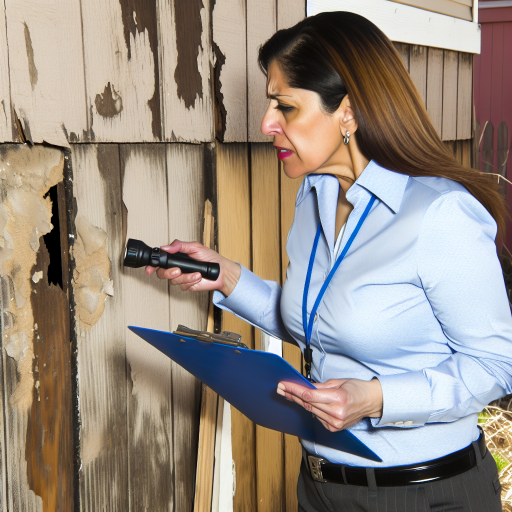Understanding the Closing Process: An Overview for First-Time Homebuyers
What is Closing?
Closing is the final step in buying a home.
During this process, ownership is officially transferred to you.
This stage includes signing documents and settling payments.
Key Participants in the Closing Process
Several key players participate in the closing process.
Your real estate agent guides you through the steps.
The lender ensures your financing is in order.
A closing agent oversees the final paperwork.
Lastly, the seller completes the transaction as well.
Documents You Will Encounter
You will encounter numerous important documents at closing.
The purchase agreement outlines your terms with the seller.
The loan estimate details the costs of your mortgage.
The closing disclosure provides final closing costs.
Additionally, you will sign the deed transferring ownership.
Understanding Closing Costs
Closing costs are an essential element of the process.
These costs usually range between two and five percent of the purchase price.
Transform Your Real Estate Decisions
Unlock personalized real estate insights crafted just for you. Get actionable advice designed to amplify your success.
Get StartedThey may include fees for appraisal and inspections.
Title insurance is also a common cost at closing.
Understanding these costs helps you budget effectively.
The Role of Escrow in Closing
Escrow is a crucial part of the closing process.
Funds and documents are held by a neutral party until closing.
This ensures that all conditions are met before finalizing the sale.
Once everything is verified, the escrow agent disburses funds.
Final Steps Before Closing
There are important steps you should complete before closing.
Review all documents closely and ask questions.
Confirm that your financing is complete and ready.
Conduct a final walkthrough of the property.
What Happens on Closing Day?
On closing day, you will meet with all key participants.
You will review and sign all needed documents.
After signing, you will pay any closing costs due.
Showcase Your Real Estate Business
Publish your company profile on our blog for just $200. Gain instant exposure and connect with a dedicated audience of real estate professionals and enthusiasts.
Publish Your ProfileFinally, you will receive keys to your new home.
Key Players Involved in the Closing Process
During the closing process, you will encounter several key players.
Each player has a specific role to ensure everything goes smoothly.
The Real Estate Agent
Your real estate agent will guide you through the process.
They negotiate the terms of the sale on your behalf.
Moreover, they help coordinate the closing timeline.
The Mortgage Lender
The mortgage lender provides the financing for your home purchase.
They will require documentation to process your loan application.
In addition, they will present you with the loan terms.
The Title Company
The title company ensures a clear title to the property.
They conduct a title search to confirm ownership records.
Furthermore, they handle the closing documents and escrow funds.
The Closing Agent
A closing agent facilitates the final steps of the sale.
They will coordinate the signing of all necessary documents.
Additionally, they explain each document to you before signing.
The Home Inspector
A home inspector assesses the property before closing.
They identify any potential issues requiring attention.
As a result, you can make informed decisions before finalizing the purchase.
The Appraiser
The appraiser determines the market value of the home.
This value impacts your mortgage approval and terms.
Thus, an appraisal is often required by the lender.
Legal Representation
Having a real estate attorney can be beneficial.
They review legal documents to protect your interests.
Moreover, they can address any legal concerns that may arise.
Understanding the roles of each player in the process is crucial.
This knowledge will help you feel more prepared as a first-time homebuyer.
Preparing for Closing Day
Understanding the Closing Process
The closing process involves finalizing the purchase of your home.
It typically occurs in an office setting with all parties present.
The lender, title company, and real estate agent will be involved.
During this meeting, you will sign various documents.
Showcase Your Real Estate Business
Publish your company profile on our blog for just $200. Gain instant exposure and connect with a dedicated audience of real estate professionals and enthusiasts.
Publish Your ProfileMoreover, you will need to provide payment for closing costs.
Essential Documents to Gather
Before closing day, collect important documents.
This includes your government-issued ID and Social Security number.
You also need bank statements and pay stubs.
Further, gather your mortgage application and loan estimate.
Lastly, have your homeowners insurance information ready.
Final Walkthrough Tips
Plan a final walkthrough a day or two before closing.
This allows you to inspect the property one last time.
Ensure all repairs agreed upon have been completed.
Check that the home is clean and free of personal items.
If any issues arise, address them with your agent immediately.
Understanding Closing Costs
Closing costs can vary based on several factors.
You should budget for expenses like appraisal fees and title insurance.
These costs can amount to 2% to 5% of the home’s price.
Be prepared for additional costs from your lender.
Review your Loan Estimate carefully to avoid surprises.
Preparing Mentally for Closing Day
Close day may feel overwhelming, but stay calm.
Remember, this is the final step in your home-buying journey.
Trust your team of professionals to guide you.
Also, come prepared with a list of questions.
Finally, celebrate your achievement once the deal is done!
Delve into the Subject: Protecting Your Investment Using A Mindful Home Inspection Checklist Approach
The Importance of a Closing Disclosure
Understanding the Closing Disclosure
A Closing Disclosure is a vital document during the home buying process.
It outlines the final details of your mortgage loan.
This document helps you understand your closing costs.
Moreover, it lists your monthly payments and interest rates.
What to Expect with Your Closing Disclosure
Expect to receive your Closing Disclosure three days before closing.
This timeframe allows you to review the information thoroughly.
Check for accuracy and raise any concerns with your lender.
It is essential to ensure there are no surprises at closing.
Showcase Your Real Estate Business
Publish your company profile on our blog for just $200. Gain instant exposure and connect with a dedicated audience of real estate professionals and enthusiasts.
Publish Your ProfileKey Information to Review
Pay special attention to loan terms stated in the document.
Verify that the interest rate matches what you were offered.
Also, double-check your monthly payment amount.
Each closing cost should also be clearly itemized.
Common Sections of the Closing Disclosure
The Closing Disclosure includes five key sections.
- Loan Terms
- Projected Payments
- Closing Costs
- Other Costs
- Calculating Cash to Close
Take your time to understand each section and its implications.
Reviewing Discrepancies
If you find discrepancies, notify your lender immediately.
It’s crucial to resolve these issues before the closing date.
Your lender wants you to feel confident and informed.
Final Preparations Before Closing
After reviewing your Closing Disclosure, confirm closing details.
Verify the location, date, and time of the closing.
Prepare all necessary documents for the final meeting.
Bring a valid ID and any required funds, as specified.
Uncover the Details: How to Balance Your Wants and Needs When Choosing a Home
Final Walkthrough: What to Look for Before Closing
Importance of the Final Walkthrough
The final walkthrough is a crucial step in the home buying process.
This is your opportunity to ensure everything is as agreed upon.
Take the time to thoroughly inspect the property.
Any issues found can be addressed before closing.
Timing of the Walkthrough
Schedule the walkthrough for the day before closing.
This ensures the home is in its intended condition.
Sometimes, a walkthrough on the day of closing is also acceptable.
Coordinate with your realtor for the best timing.
What to Inspect During the Walkthrough
Check for any damages that may have occurred since the last visit.
Verify that all agreed-upon repairs have been completed.
Ensure all appliances included in the sale are present and functional.
Test the plumbing fixtures, such as faucets and toilets.
Look for leaks or any signs of water damage.
Final Checks for Cleanliness and Condition
Ensure the home is clean and free from debris.
Inspect floors, walls, and ceilings for any new marks or damages.
Confirm that all windows and doors operate properly.
Showcase Your Real Estate Business
Publish your company profile on our blog for just $200. Gain instant exposure and connect with a dedicated audience of real estate professionals and enthusiasts.
Publish Your ProfileCheck that the landscaping is as expected.
Reviewing Closing Documents
If possible, bring a copy of the purchase agreement.
Compare the documents against your original agreement.
Ensure that all discrepancies are noted for discussion.
This helps prevent any misunderstandings later on.
Addressing Issues Found
If you find any issues during the walkthrough, address them immediately.
Contact your real estate agent for guidance on next steps.
Discuss whether the closing can be delayed if significant issues arise.
Make sure everything is resolved before moving forward.
Explore Further: Understanding Credit Scores For First-Time Homebuyers In The USA
Common Closing Costs
Overview of Closing Costs
Closing costs are essential expenses in the homebuying process.
They typically range from 2% to 5% of the home purchase price.
Understanding these costs helps you prepare financially.
Types of Closing Costs
Different types of closing costs arise during the process.
Here are several common categories you should know:
- Loan origination fees
- Appraisal fees
- Title insurance
- Escrow fees
- Home inspection fees
- Property taxes
Loan Origination Fees
Loan origination fees cover the lender’s costs in processing your loan.
This fee often equals about 0.5% to 1% of the total loan amount.
You can negotiate this fee with the lender.
Appraisal Fees
An appraisal verifies the home’s value for the lender.
This fee usually amounts to a few hundred dollars.
Keep in mind that this cost is typically non-refundable.
Title Insurance
Title insurance protects against issues with the property title.
This insurance ensures that you legally own the property without disputes.
Costs for title insurance vary based on the home’s purchase price.
Escrow Fees
Escrow fees involve managing the funds during the transaction.
These fees typically go to an escrow company or attorney.
Expect to pay a small percentage of the sale price.
Home Inspection Fees
A home inspection ensures the property is safe and sound.
This fee generally ranges from $300 to $500.
Consider this step essential before finalizing your purchase.
Showcase Your Real Estate Business
Publish your company profile on our blog for just $200. Gain instant exposure and connect with a dedicated audience of real estate professionals and enthusiasts.
Publish Your ProfileProperty Taxes
Property taxes are often prorated as part of the closing costs.
This amount varies significantly depending on the location.
Take time to research what to expect in your area.
Understanding Escrow Accounts
Escrow accounts hold funds for property-related expenses.
These accounts help ensure timely mortgage payments and property taxes.
Typically, lenders require two months’ worth of payments at closing.
Final Walkthrough and Closing Day
Your final walkthrough occurs before the closing day.
This step allows you to verify the home’s condition.
Make sure all agreed-upon repairs have been completed.
On closing day, you will sign various documents.
These documents finalize the purchase of your new home.
Additionally, you’ll provide payment for closing costs at this time.
Delve into the Subject: Home Inspection Checklist For Buying Older Homes In The USA

The Signing Process: What Documents You’ll Need to Sign
Initial Documents
During the closing, you will begin with several key documents.
The first is the purchase agreement.
This outlines the terms you and the seller have agreed upon.
Next, you will review the seller’s disclosures.
This provides details about the property condition.
Ensure you understand these before proceeding.
Financial Documents
Financial documents are also crucial during the closing process.
You must sign the loan estimate provided by your lender.
This estimate outlines the loan terms and costs.
Additionally, you will need to sign the closing disclosure.
This document summarizes the final terms of your loan.
It’s essential to review all fees carefully.
Title and Ownership Documents
Ownership documents are significant for securing your property rights.
You will need to sign the deed of trust or mortgage.
This document pledges the property as collateral for the loan.
Next, you will review the title insurance policy.
This protects you against any title issues in the future.
Showcase Your Real Estate Business
Publish your company profile on our blog for just $200. Gain instant exposure and connect with a dedicated audience of real estate professionals and enthusiasts.
Publish Your ProfileFinal Sign-off
After signing all necessary documents, you’ll perform the final sign-off.
This is when you declare your understanding and approval of everything.
Confirm you have received all relevant copies for your records.
Finally, ask any last-minute questions you may have.
Post-Closing Steps: What Happens After You Sign the Papers
Understanding the Closing Process
After you sign the closing documents, the process continues with various important steps.
The settlement agent will now file the necessary paperwork with the appropriate authorities.
This includes submitting documents to the county recorder’s office to finalize ownership.
Additionally, the lender will disburse the funds to the seller on your behalf.
You may also receive copies of all signed documents for your records.
Home Ownership Transition
As a first-time homeowner, you will need to prepare for the transition to your new home.
This involves setting up utilities such as water, electricity, and internet.
You should contact service providers to ensure everything is ready for your move-in date.
Moreover, consider changing the locks for added security.
Finalizing Your Mortgage
Once the mortgage is finalized, you will begin your repayment journey.
Understand your mortgage terms, including interest rates and payment schedules.
It’s crucial to establish a budget for monthly payments to ensure timely repayment.
Frequently review your mortgage statements for accuracy and clarity.
Settling In
Finally, you can focus on settling into your new house.
Develop a plan for moving your belongings and organizing your space.
It’s wise to meet your new neighbors to foster community ties.
Above all, enjoy the journey of homeownership as you create lasting memories.
Tips for a Smooth Closing Experience
Prepare Your Documentation
Gather all necessary paperwork in advance.
This includes bank statements, tax returns, and employment records.
Ensure you have a clear copy of your mortgage agreement.
Organizing your documents helps reduce last-minute stress.
Understand Closing Costs
Acquire a detailed estimate of closing costs from your lender.
Review this estimate thoroughly to avoid surprises.
Consider budgeting for these costs when planning your purchase.
Work with Experienced Professionals
Choose a reputable real estate agent to guide you.
Your agent can provide valuable insights during negotiations.
Showcase Your Real Estate Business
Publish your company profile on our blog for just $200. Gain instant exposure and connect with a dedicated audience of real estate professionals and enthusiasts.
Publish Your ProfileAdditionally, consider hiring an experienced attorney for contract review.
Stay in Communication
Maintain open lines of communication with all parties.
This includes your lender, agent, and seller.
Regular updates help ensure everyone is on the same page.
Be Ready for Inspections
Schedule home inspections early in the process.
Address any issues prior to closing to streamline the experience.
Being proactive can save you headaches later on.
Avoid Common Pitfalls
Do not make large financial changes before closing.
Changing jobs or taking on new debt can affect your mortgage approval.
Stay consistent with your financial status during this period.
Additional Resources
What happens at and after closing? : r/FirstTimeHomeBuyer




